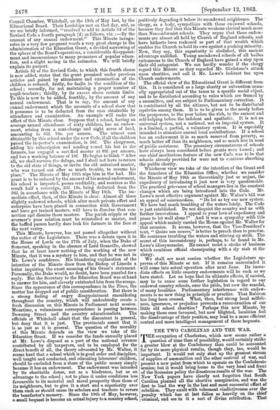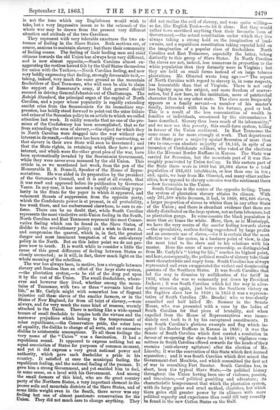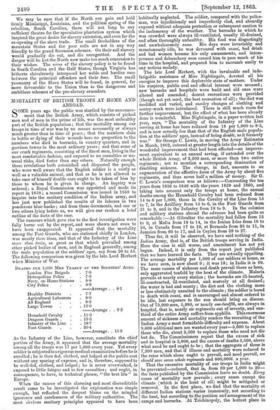THE TWO CAROLINAS AND THE WAR.
11111E occupation of Charleston, which now seems rather a J_ question of time than of possibility, would certainly strike a greater blow at the Confederacy than could be accounted for by its mere physical results, though they, too, would be important. It would not only shut up the greatest stream of supplies of ammunition and the other materiel of war, and present a new point from which to operate on the Confederate armies; but it would bring home to the very head and front of the Secession policy the disastrous results of the war. The- New York papers have clearly not forgotten that South Carolina planned all the abortive conspiracies, and was the first to lead the way in the last and most successful effort of rebellion. They exult with vehement vindictiveness over the penalty which has at last fallen so heavily on the chief criminal, and see in it a sort of divine retribution. That is not the tone which any Englishman would wish to take, but a very impreeaive lesson as to the rationale of the whole war may be drawn from the present very different situation and attitude of the two Carolinas.
They represent with very tolerable exactness the two ex- tremes of feeling in the Slave States. Both sections are, of course anxious to maintain slavery; but there their community of feeling ceases. The feeling of their leading men and chief citizens towards the old Union has always been very different, and is now almost opposite,—South Carolina almost ex- aggerating the restless hatred felt by the Gulf States themselves for union with the Yankees,—North Carolina feeling, and now very boldly expressing that feeling, strongly favourable to it,— taking, indeed, very much the same ground as the mountain freeholders of East Tennessee, who will soon be able to claim the support of Rosecranz's army, if that general should succeed in driving General Johnston out of Chattanooga. The .Raleigh Standard, the principal organ of the capital of North Carolina, and a paper whose popularity is rapidly extending amidst cries from the Secessionists for its immediate sup- pression, has boldly stood forward to point out the utter failure and crime of the Secession policy in an article to which we called attention last week. It coldly remarks that no one of the pro- mises of the Confederacy has been accomplished, that so far from extending the area of slavery,—the object for which they in North Carolina were dragged into the war without any interest in its result,—that area has been rapidly contracting, so that slavery in their own State will soon be threatened ; and that the State rights, in retaining which they have a great interest, and which were the other great plea of the war, have been systematically invaded by the Secessionist Government, while they were never even menaced by the old Union. This article is, as we mentioned last week, from the pen of the Honourable R. S. Donnell, Speaker of the House of Repre- sentatives. He was aided in its preparation by the president IA the Governor's Council, and it is said at all events, that it was read and approved before its publication by Governor Vance. In any case, it has secured a rapidly extending popu- larity in the State for the paper in which it appeared, and vehement threats of suppression from the opposite party, which the Confederate power is at present, in all probability, too weak there, and too embarrassed elsewhere, to care to en- force. There can be no doubt that, while South Carolina represents the most vindictive anti-Union feeling in the South, North Carolina and East Tennessee represent the most Conser- vative feeling which can be found in the Slave States, of dislike to the revolutionary policy; and a wish to thwart it, and compromise the quarrel, which is, in fact, the greatest danger and most imminent temptation of the anti-slavery policy in the North. But on this latter point we do not pro- pose now to touch. It is worth while to consider a little the cause of this great difference of feeling between States so closely connected ; as it will, in fact, throw much lighten the whole meaning of the rebellion.
The war has always been, in motive, less a struggle between slavery and freedom than an effort of the large slave system, —the plantation system,—to be rid of the drag put upon it by the rest of the Union. The small freeholders, where- ever and however they lived, whether among the moun- tains of Tennessee with two or three "servants hired for life," as Mr. Carlyle might with somewhat less of flagrant injustice call these slaves of the smaller farmers, or in the States of New England, far from all taint of slavery,—were always and for very much the same kind of reasons, warmly attached to the Union. There is nothing like a wide-spread tenure of small freeholds to inspire both the virtues and the narrower prejudices which belong to the temperament of sober republicans,—the Conservative pride, the sober love of equality, the dislike to change of all sorts' and an excessive dislike to aristocratic assumptions. To all these feelings the very name of the " Union ' was a fascination. It had a republican sound. It appeared to express nothing but an equal association of States for purposes of common moment, and yet it did express a very great national power and authority, which gave each freeholder a pride in his country. It satisfied at once the municipal feeling, the republican feeling, and the national feeling of the yeoman. It gave him a strong Government, and yet enabled him to feel, in some sense, on a level with his Government. And among the small farmers of this kind, who are the great country party of the Northern States, a very important element in the poorer soils and mountain districts of the Slave States, and of some little weight even in the South, there never was any feeling but one of almost passionate conservatism for the Union. They did not much care to change anything. They did not realize the evil of slavery, and were quite willing— so far, like English Tories—to let it alone. But they would rather have sacrificed anything than their favourite form of Government,—the actual constitution under which they live always taking a strong hold on the imagination of land- owners, and a republican constitution taking especial hold on the imagination of a popular class of freeholders. North Carolina and East Tennessee, especially the latter, belong distinctly to this group of Slave States. In North Carolina the slaves are not, indeed, loss numerous in proportion to the white population than they formerly were in Virginia ; but they are held on small farms instead of on large tobacco plantations. Mr. Olmsted wrote long ago :—" The aspect of North Carolina with regard to slavery is, in some respects, less lamentable than that of Virginia. There is not wily less bigotry upon the subject, and more freedom of conver- sation, but I saw here, in the institution, more of patriarchal character than in any other state. The slave more frequently appears as a family servant—a member of his master's family, interested with him in his fortune, good or bad. This is a result of the less concentration of wealth in families or individuals, occasioned by the circumstances I have described. Slavery thus loses much of its inhumanity;" and we now see this poverty, this small-farm system, telling in favour of the Union sentiment. In East Tennessee the same cause is far more strongly at work. That department of the State gave a majority against Secession of more than two to one,—an absolute majority of 18,155, in spite of an incursion of Confederate soldiers, who voted at the elections like the Missouri Border Ruffians in Kansas. The State was carried for Secession, but the mountain part of it was tho- roughly penetrated by Union feeling. In this eastern part of the State there were in 1860 but 26,504 slaves to a total population of 282,021 inhabitants, or less than one in ten ; and, again, we hear from Mr. Olmsted, and many other autho- rities, how opposed to slavery extension was the sentiment there —how favourable to the Union.
South Carolina is the centre of the opposite feeling. There the system of plantation slavery attains its climax. With only 291,388 white freemen, it had, in 1860, 402,406 slaves, a larger proportion of slaves to whites than in any other State of the Union ; and there is abundant evidence that these are chiefly distributed on the large system, not as farm labourers, but as plantation gangs. In some counties the black population is more than six times the white. Here, then, as in Mississippi, we have the very centre of the market feeling towards slaves —the speculative, restless feeling engendered by large profits and an economic use of slaves,—for it is certain that the most effective use of the system, in a business point of view, is also the most fatal to the slave and to his relations with his master. Here the sense of mere ownership, as distinguished from Mr. Carlyle's "hiring for life," reaches its highest point, and here, consequently, the political results of slavery take their most characteristic and angry form. South Carolina has always represented and even exaggerated the violent and domineering passions of the Southern States. It was South Carolina that led the way to disunion by nullification of the tariff in 1832, when she was so summarily put down by President Jackson ; it was South Carolina which led the way in advo- cating secession again, just before the Southern victory on the fugitive slave law in 1850; in 1855 it was a represen- tative of South Carolina (Mr. Brooks) who so truculently assaulted and half killed Mr. Sumner in the Senate House, who was presented with a cane by the ladies of South Carolina for that piece of brutality, and when expelled from the House of Representatives was imme- diately sent back to it by his enraptured constituents. It was South Carolina's glorious example and flag which in- spired the Border Ruffians in Kansas in 1856; it was the Senate of South Carolina which first carried a resolution in favour of re-opening the slave trade in 1859; vigilance com- mittees in South Carolina offered rewards for the heads of their enemies (anti-slavery agitators) after the election of Mr. Lincoln; it was the convention of this State which first decreed separation ; and it was South Carolina which first seized the Government-fort Moultrie, and which committed the first act of war in assaulting Fort Sumter. South Carolina has, in short, been the typical Slave State,—its political history throughout the Union having been one of violence, passion, and truculence,—of political gambling and adventure; its characteristic temperament that which the plantation system, with its large gains and cruel method, cherishes, but winch there gains still greater power by its alliance with more political capacity and experience than could till very recently be found in the new Cotton States on the Gulf. We may be sure that if the North can gain and hold firmly Mississippi, Louisiana, and the political spring of the rebellion, South Carolina, there will not long be any sufficient theatre for the speculative plantation system which inspired the great desire for slavery extension, and even for the re-opening of the slave trade. The small freeholders of the mountain States and the poor soils are not in any way friendly to the grand Secession schemes. On their soil slavery would gradually die out, and die unregretted. And the danger will be lest the North now make too much concession to their wishes. The virus of the slavery policy is to be found in South Carolina and the Gulf States, though Virginia has hitherto chivalrously interposed her noble and hardier race between the principal offenders and their foes. The small yeomanry of the Slave States will be found, in general, far more favourable to the Union than to the dangerous and ambitious schemes of the pro-slavery crusaders.




































 Previous page
Previous page